Fleurs du Mal Magazine


Or see the index
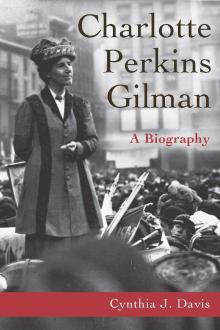
The Anti-Sufragists
Fashionable women in luxurious homes,
With men to feed them, clothe them, pay their bills,
Bow, doff the hat, and fetch the handkerchief;
Hostess or guest; and always so supplied
With graceful deference and courtesy;
Surrounded by their horses, servants, dogs–
These tell us they have all the rights they want.
Successful women who have won their way
Alone, with strength of their unaided arm,
Or helped by friends, or softly climbing up
By the sweet aid of “woman’s influence”;
Successful any way, and caring naught
For any other woman’s unsuccess–
These tell us they have all the rights they want.
Religious women of the feebler sort–
Not the religion of a righteous world,
A free, enlightened, upward-reaching world,
But the religion that considers life
As something to back out of !– whose ideal
Is to renounce, submit, and sacrifice.
Counting on being patted on the head
And given a high chair when they get to heaven–
These tell us they have all the rights they want.
Ignorant women–college bred sometimes,
But ignorant of life’s realities
And principles of righteous government,
And how the privileges they enjoy
Were won with blood and tears by those before–
Those they condemn, whose ways they now oppose;
Saying, “Why not let well enough alone?”
Our world is very pleasant as it is”–
These tell us they have all the rights they want.
And selfish women–pigs in petticoats–
Rich, poor, wise, unwise, top or bottom round,
But all sublimely innocent of thought,
And guiltless of ambition, save the one
Deep, voiceless aspiration–to be fed!
These have no use for rights or duties more.
Duties today are more than they can meet,
And law insures their right to clothes and food–
These tell us they have all the rights they want.
And, more’s the pity, some good women too;
Good, conscientious women with ideas;
Who think–or think they think–that woman’s cause
Is best advanced by letting it alone;
That she somehow is not a human thing,
And not to be helped on by human means,
Just added to humanity–an “L”–
A wing, a branch, an extra, not mankind–
These tell us they have all the rights they want.
And out of these has come a monstrous thing,
A strange, down-sucking whirlpool of disgrace,
Women uniting against womanhood,
And using that great name to hide their sin!
Vain are their words as that old king’s command
Who set his will against the rising tide.
But who shall measure the historic shame
Of these poor traitors–traitors are they all–
To great Democracy and Womanhood!
Charlotte Perkins Gilman
(1860-1935)
The Anti-Sufragists
Suffrage Songs and Verses
• fleursdumal.nl magazine
More in: #Editors Choice Archiv, Archive O-P, Archive O-P, Feminism, The Ideal Woman
In this powerful collection of interviews, Noam Chomsky exposes the problems of our world today, as we stand in this period of monumental change, preparing for a more hopeful tomorrow.
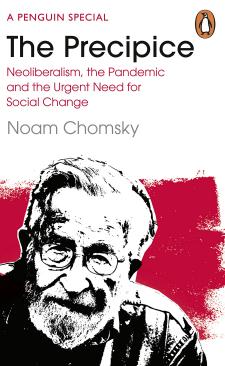 ‘For the left, elections are a brief interlude in a life of real politics, a moment to ask whether it’s worth taking time off to vote . . . Then back to work. The work will be to move forward to construct the better world that is within reach.’
‘For the left, elections are a brief interlude in a life of real politics, a moment to ask whether it’s worth taking time off to vote . . . Then back to work. The work will be to move forward to construct the better world that is within reach.’
He sheds light into the phenomenon of right-wing populism, and exposes the catastrophic nature and impact of authoritarian policies on people, the environment and the planet as a whole. He captures the dynamics of the brutal class warfare launched by the masters of capital to maintain and even enhance the features of a dog-eat-dog society. And he celebrates the recent unprecedented mobilizations of millions of people internationally against neoliberal capitalism, racism and police violence.
We stand at a precipice and we must fight to pull the world back from it.
Noam Chomsky is Institute Professor in the Department of Linguistics and Philosophy at the Massachusetts Institute of Technology, Boston. A member of the American Academy of Science, he has published widely in both linguistics and current affairs. His books include At War with Asia, Towards a New Cold War, Fateful Triangle: The U. S., Israel and the Palestinians, Necessary Illusions, Hegemony or Survival, Deterring Democracy, Failed States: The Abuse of Power and the Assault on Democracy and Manufacturing Consent: The Political Economy of the Mass Media.
C. J. Polychroniou is a regular contributor to Truthout as well as a member of Truthout’s Public Intellectual Project. He has published several books and his articles have appeared in a variety of journals, magazines, newspapers, and popular news websites.
# new books
The Precipice: Neoliberalism, the Pandemic
and the Urgent Need for Radical Change
by Noam Chomsky
and C. J. Polychroniou
Publisher : Penguin Books Ltd
June 24, 2021
Language : English
ISBN-10: 0241993938
ISBN-13: 978-0241993934
Paperback
368 pages
€ 7,99
• fleursdumal.nl magazine
More in: - Book News, - Bookstores, Archive C-D, Archive O-P, Noam Chomsky, Racism, REPRESSION OF WRITERS, JOURNALISTS & ARTISTS
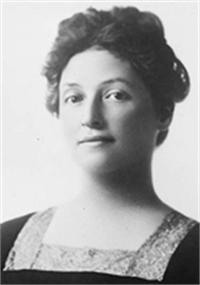
The Foundling
Beautiful Mother, I have toiled all day;
And I am wearied. And the day is done.
Now, while the wild brooks run
Soft by the furrows–fading, gold to gray,
Their laughters turned to musing–ah, let me
Hide here my face at thine unheeding knee,
Beautiful Mother; if I be thy son.
The birds fly low. Gulls, starlings, hoverers,
Along the meadows and the paling foam,
All wings of thine that roam
Fly down, fly down. One reedy murmur blurs
The silence of the earth; and from the warm
Face of the field the upward savors swarm
Into the darkness. And the herds are home.
All they are stalled and folded for their rest,
The creatures: cloud-fleece young that leap and veer;
Mad-mane and gentle ear;
And breath of loving-kindness. And that best,–
O shaggy house-mate, watching me from far,
With human-aching heart, as I a star–
Tempest of plum’d joys, just to be near!
So close, so like, so dear; and whom I love
More than thou lovest them, or lovest me.
So beautiful to see,
Ah, and to touch! When those far lights above
Scorch me with farness–lights that call and call
To the far heart, and answer not at all;
Save that they will not let the darkness be.
And what am I? That I alone of these
Make me most glad at noon? That I should mark
The after-glow go dark?
This hour to sing–but never have–heart’s-ease!
That when the sorrowing winds fly low, and croon
Outside our happy windows their old rune,
Beautiful Mother, I must wake, and hark?
Who am I? Why for me this iron Must?
Burden the moon-white ox would never bear;
Load that he cannot share,
He, thine imperial hostage of the dust.
Else should I look to see the god’s surprise
Flow from his great unscornful, lovely eyes–
The ox thou gavest to partake my care.
Yea, all they bear their yoke of sun-filled hours.
I, lord at noon, at nightfall no more free,
Take on more heavily
The yoke of hid, intolerable Powers.
–Then pushes here, in my forgetful hand,
This near one’s breathless plea to understand.
Starward I look; he, even so, at me!
And she who shines within my house, my sight
Of the heart’s eyes, my hearth-glow, and my rain,
My singing’s one refrain–
Are there for her no tidings from the height?
For her, my solace, likewise lost and far,
Islanded with me here, on this lone star
Washed by the ceaseless tides of dark and light.
What shall it profit, that I built for her
A little wayside shelter from the stark
Sky that we hear, and mark?
Lo, in her eyes all dreams that ever were!
And cheek-to-cheek with me she shares the quest,
Her heart, as mine for her, sole tented rest
From light to light of day; from dark–till Dark.
Yea, but for her, how should I greatly care
Whither and whence? But that the dark should blast
Our bright! To hold her fast,–
Yet feel this dread creep gray along the air.
To know I cannot hold her so my own,
But under surge of joy, the surges moan
That threaten us with parting at the last!
Beautiful Mother, I am not thy son.
I know from echoes far behind the sky.
I know; I know not why.
Even from thy golden, wide oblivion:
Thy careless leave to help thy harvesting,
Thy leave to work a little, live, and sing;
Thy leave to suffer–yea, to sing and die,
Beautiful Mother! …
Ah, Whose child am I?
Love sang to me. And I went down the stair,
And out into the darkness and the dew;
And bowed myself unto the little grass,
And the blind herbs, and the unshapen dust
Of earth without a face. So let me be.
For as I hear, the singing makes of me
My own desire, and momently I grow.
Yea, all the while with hands of melody,
The singing makes me, out of what I was,
Even as a potter shaping Eden clay.
Ever Love sings, and saith in words that sing,
‘Beloved, thus art thou; and even so
Lovely art thou, Beloved!’–Even so,
As the Sea weaves her path before the light,
I hear, I hear, and I am glorified.
Love sang to me, and I am glorified
Because of some commandment in the stars.
And I shall grow in favour and in shining,
Till at the last I am all-beautiful;
Beautiful, for the day Love sings no more.
Josephine Preston Peabody
(1874 – 1922)
The Foundling
• fleursdumal.nl magazine
More in: # Classic Poetry Archive, Archive O-P, Archive O-P
PARK is een kunstinitiatief opgericht in 2013 door Rob Moonen in samenwerking met een zestal andere Tilburgse kunstenaars. Op dit moment bestaat de PARK werkgroep uit Linda Arts, René Korten, Rob Moonen en Liza Voetman.
PARK ziet de noodzaak van een middenpodium dat zich positioneert tussen Kunstpodium T en Museum De Pont en zet zich daarvoor in door een tentoonstellingsprogramma in de voormalige Goretti-kapel aan het Wilhelminapark te Tilburg te realiseren.
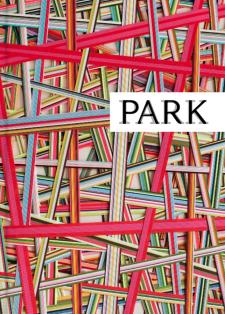 PARK richt zich op actuele ontwikkelingen binnen de hedendaagse kunst én op kunstenaars met gedegen ervaring en bewezen kwaliteit. Er wordt plek geboden aan regionale collega’s maar ook aan landelijk of internationaal opererende kunstenaars, juist om een positieve bijdrage aan de discussie over actuele kunst tot stand te brengen.
PARK richt zich op actuele ontwikkelingen binnen de hedendaagse kunst én op kunstenaars met gedegen ervaring en bewezen kwaliteit. Er wordt plek geboden aan regionale collega’s maar ook aan landelijk of internationaal opererende kunstenaars, juist om een positieve bijdrage aan de discussie over actuele kunst tot stand te brengen.
De werkgroep ambieert het podium van belang te laten zijn op landelijk niveau, maar bij elk project wordt met nadruk gezocht naar een inhoudelijke koppeling met de stad. De werkgroep is er van overtuigd dat samenwerking met andere partijen de zichtbaarheid en functionaliteit van de plek zal versterken, maar ook dat de plek een waardevolle stimulans voor de beeldende kunst in de stad en de regio zal kunnen zijn.
PARK wil een bijdrage leveren aan de ontwikkeling van een gunstig productie- en vestigingsklimaat voor beeldend kunstenaars uit de regio door deze in contact te brengen met een nationaal en internationaal netwerk.
Per jaar worden er vier a vijf projecten en een zomerresidentie gerealiseerd met waar mogelijk een bijpassend raamprogramma in de vorm van lezingen, kunstenaarsgesprekken, muziek en film.
Nieuw boek over activiteiten PARK
PARK maakte een boek waarin alle tentoonstellingsprojecten, alle ongeveer 200 deelnemende kunstenaars en alle extra activiteiten in de periode 2018-2020 aan bod komen.
Het rijk-geïllustreerde full-colour boek, met teksten van Anneke van Wolfswinkel en Rob Moonen in Nederlands en Engels, is vormgegeven door Berry van Gerwen. Het telt ruim 200 pagina’s en verschijnt in een oplage van 600 stuks.
Het is de opvolger van de eerder verschenen boeken ‘PARK 2013-2015’ en ‘PARK 2016-2018’.
Het boek kost € 17,50 exclusief eventuele verzendkosten. Verzendkosten binnen Nederland bedragen € 5,- per exemplaar, binnen Europa € 10,- per exemplaar.
Alle tentoonstellingsprojecten, alle ongeveer 200 deelnemende kunstenaars en alle extra activiteiten in de periode 2018-2020 komen aan bod.
Het rijk-geïllustreerde full-colour boek, met teksten van Anneke van Wolfswinkel en Rob Moonen in Nederlands en Engels, is vormgegeven door Berry van Gerwen. Het boek telt ruim 200 pagina’s en verschijnt in een oplage van 600 stuks.
De normale verkoopprijs van één exemplaar is € 17,50 inclusief 9% BTW, exclusief verzendkosten.
Korting bij aanschaf van meerdere exemplaren:
Twee exemplaren voor € 30,-
Drie exemplaren voor € 40,-
Bestellen: zie adres website. Verzendkosten binnen Nederland bedragen € 5 per exemplaar. Voor verzendkosten naar het buitenland kunt u contact opnemen via de website. U kunt het boek ook ophalen tijdens de reguliere openingstijden.
Deelnemende kunstenaars / participating artists:
Piet Dieleman, Jan van der Ploeg, Beat Zoderer, Koen Delaere, Ide André, Toine Horvers, Niko de Wit, Marina Visic, Tineke Schuurmans, Paul van Rijswijk, Chantal Rens, Tyrell Kuipers, Stijn Kriele, Pim Kersten, Jasper van Aarle, Ien Lucas, Jochem Rotteveel, Jonathan van Doornum, Stefan Cammeraat, Bart Hess, Jenny Holzer, Mark Manders, Johan Tahon, Guus Voermans, Stan Wannet, Jenny Ymker, Bram van Helden, Nick Steur, Ienke Trinks, Wild Vlees, Thomas Swinkels, Ronald de Bloeme, Olaf Holzappel, Jonas Wijtenburg, Tom Claassen, Roland Sohier, Hans Klein Hofmeijer, Ronny Delrue, Florette Dijkstra, ArpaÏs De Bois, Heringa / Van Kalsbeek, Wiesje Peels / Steffen Maas, Lennart Lahuis, Lieven Segers, Koen Vermeulen, Renée van Trier, Bram Braam, Anneke Eussen, Astrid Abels, Hans van Asch, Linda Arts, Atelier La Machine, Niels Ballemans, Simon Benson, Fieke van Berkom, Tarek Beshta, Gam Bodenhausen, Claudia den Boer, Peter Bouwmans, Danielle van Broekhoven, Helmie Brugman, Aurelia van der Burght, Liesbeth Bijkerk, Ruud de Caluwe, Mark Cohen, Michiel Corten, Lennart Creutzburg, Steve Cromsigt, Michaela Davidova, Femke Dekkers, Cor van Dixhoorn, Vince Donders, Miek van Dongen, Paul van Dongen, David Engel, Jacomijn den Engelsen, Jesse Fischer, Kirsty Fletcher, Frans Franssen, Alexandra Fraser, Fred Geven, Eefje Goos, Nan Groot Antink, Vincent Hagnauer, Coen van Ham, Janine Hendriks, Caren van Herwaarden, Jola Hesselberth, Marianne van Hest, Jolijn van den Heuvel, Mark van den Heuvel, Menno Heijstek, Florence Husen, Wanda Janota, Bas Ketelaars, Gaston Klein, Hanneke Klinkum, Kees van der Knaap, Marja Koenraad, Guus Koenraads, Jordy Koevoets, Lucia Koevoets, René Korten, José Krijnen, Liedeke Kruk, Judith Kuijpers, Tyrell Kuipers, Marjolein Landman, Anna Lange, Ivo van Leeuwen & Sander Neijnens, Danielle Lemaire, Sarah Linde, Gijs van Lith, Margriet Luyten, Mainkunstenaars, Fons Manders, Saskia de Marée, Vincent McGourty, Janus Metsaars, Vera Meulendijks, Jolanda Moolenaar, Rob Moonen, Wiebo van Mulligen, Remy Neumann, Bertil Neijts, Toos Nijssen, Dineke van Oosten, Frits Peeters, Brigitte Picavet, Carola Popma, Har van der Put, Just Quist, Claudette van de Rakt, Anke Reevers, Chantal Rens, Stijn Rompa, Frans van Santvoort, Lilia Scheerder, Ro-Nalt Schrauwen, Ron Schöningh, Eef Schoolmeesters, Karin Schreppers, Lydia Scheurleer, Ies Schute, Lucas Silawanebessy, Ingrid Simons, Yda Sinay, Ian Skirvin, Roel Sloot, Rob Smulders, Joran van Soest, Ine van Son, Bo Stokkermans, Jos van der Sommen, Lise Sore, Francine Steegs, Nick J. Swarth, Asha Swillens, Anna Marie van Thiel de Vries, Hugo Tieleman, Sabina Timmermans, Renée van Trier, Lieke Tripaldelli, Mieke Van den Hende, Guus van der Velden, Leopold van de Ven, Nina van de Ven, Dieke Venema, Erik Vermeulen, Cecile Verwaaijen, Judith de Vet, Josine Vissers, Roos Vogels, Ruth de Vos, Roger Walschots, Marie-Louise Wasiela, Hanneke Wetzer, Tine van de Weyer, Bas Wiegmink, Yvonne Willemse, Hans de Wit, Emmy Zwagers.
• PARK 2018-2020
• nieuwe uitgave PARK Tilburg 2021
P A R K
Wilhelminapark 53, 5041 ED Tilburg
park(at)park013.nl
https://park013.nl/nl/contact
Twitter.com/ParkTilburg
Facebook.com/Park013
https://www.instagram.com/park_tilburg/
Tijdens tentoonstellingen geopend:
vrijdag 13.00 – 17.00 uur
zaterdag 13.00 – 17.00 uur
zondag 13.00 – 17.00 uur
Toegang is gratis
PARK ligt op 10 minuten loopafstand van het Centraal Station Tilburg in de nabijheid van Museum De Pont. Er is beperkt parkeergelegenheid voor de deur.
PARK
Rob Moonen, Linda Arts, René Korten, Liza Voetman
Graphic design: Berry van Gerwen, Breda
Supported by: Gemeente Tilburg, KunstLoc, provincie Noord Brabant, Mondriaan Fonds
• fleursdumal.nl magazine
More in: - Book News, Architecture, Archive O-P, Art & Literature News, Art Criticism, AUDIO, CINEMA, RADIO & TV, Exhibition Archive, Linda Arts, Park
The director of the famed Bodleian Libraries at Oxford narrates the global history of the willful destruction―and surprising survival―of recorded knowledge over the past three millennia.
 Libraries and archives have been attacked since ancient times but have been especially threatened in the modern era. Today the knowledge they safeguard faces purposeful destruction and willful neglect; deprived of funding, libraries are fighting for their very existence. Burning the Books recounts the history that brought us to this point.
Libraries and archives have been attacked since ancient times but have been especially threatened in the modern era. Today the knowledge they safeguard faces purposeful destruction and willful neglect; deprived of funding, libraries are fighting for their very existence. Burning the Books recounts the history that brought us to this point.
Richard Ovenden describes the deliberate destruction of knowledge held in libraries and archives from ancient Alexandria to contemporary Sarajevo, from smashed Assyrian tablets in Iraq to the destroyed immigration documents of the UK Windrush generation. He examines both the motivations for these acts―political, religious, and cultural―and the broader themes that shape this history. He also looks at attempts to prevent and mitigate attacks on knowledge, exploring the efforts of librarians and archivists to preserve information, often risking their own lives in the process.
More than simply repositories for knowledge, libraries and archives inspire and inform citizens. In preserving notions of statehood recorded in such historical documents as the Declaration of Independence, libraries support the state itself. By preserving records of citizenship and records of the rights of citizens as enshrined in legal documents such as the Magna Carta and the decisions of the US Supreme Court, they support the rule of law. In Burning the Books, Ovenden takes a polemical stance on the social and political importance of the conservation and protection of knowledge, challenging governments in particular, but also society as a whole, to improve public policy and funding for these essential institutions.
Richard Ovenden
Burning the books. A history of knowledge under attack
Publisher: Belknap Press
An Imprint of Harvard University Press
November 17, 2020
Language: English
Hardcover
320 pages
ISBN-10: 0674241207
ISBN-13: 978-0674241206
$29.95
Burning the Books is available internationally through the following publishers:
US: Harvard UP
German: Surhkamp
Italian: Solferino
Spanish: Editorial Critica
Arabic: Arab Scientific Publishers
• fleursdumal.nl magazine
More in: - Book Lovers, - Book News, - Book Stories, Archive O-P, Libraries in Literature

Canticle Of The Babe
I
Over the broken world, the dark gone by,
Horror of outcast darkness torn with wars;
And timeless agony
Of the white fire, heaped high by blinded Stars,
Unfaltering, unaghast;–
Out of the midmost Fire
At last,–at last,–
Cry! …
O darkness’ one desire,–
O darkness, have you heard?–
Black Chaos, blindly striving towards the Word?
–The Cry!
Behold thy conqueror, Death!
Behold, behold from whom
It flutters forth, that triumph of First-Breath,
Victorious one that can but breathe and cling,–
This pulsing flower,–this weaker than a wing,
Halcyon thing!–
Cradled above unfathomable doom.
II
Under my feet, O Death,
Under my trembling feet!
Back, through the gates of hell, now give me way.
I come.–I bring new Breath!
Over the trampled shards of mine own clay,
That smoulder still, and burn,
Lo, I return!
Hail, singing Light that floats
Pulsing with chorused motes:–
Hail to thee, Sun, that lookest on all lands!
And take thou from my weak undying hands,
A precious thing, unblemished, undefiled:–
Here, on my heart uplift,
Behold the Gift,–
Thy glory and my glory, and my child!
III
(And our eyes were opened; eyes that had been holden.
And I saw the world, and the fruits thereof.
And I saw their glories, scarlet-stained and golden,
All a crumbled dust beneath the feet of Love.
And I saw their dreams, all of nothing worth;
But a path for Love, for Him to walk above,
And I saw new heaven, and new earth.)
IV
The grass is full of murmurs;
The sky is full of wings;
The earth is full of breath.
With voices, choir on choir
With tongues of fire,
They sing how Life out-sings–
Out-numbers Death.
V
Who are these that fly;
As doves, and as doves to the windows?
Doves, like hovering dreams round Love that slumbereth;
Silvering clouds blown by,
Doves and doves to the windows,–
Warm through the radiant sky their wings beat breath.
They are the world’s new-born:
Doves, doves to the windows!
Lighting, as flakes of snow;
Lighting, as flakes of flame;
Some to the fair sown furrows;
Some to the huts and burrows
Choked of the mire and thorn,–
Deep in the city’s shame.
Wind-scattered wreaths they go,
Doves, and doves, to the windows;
Some for worshipping arms, to shelter and fold, and shrine;
Some to be torn and trodden,
Withered and waste, and sodden;
Pitiful, sacred leaves from Life’s dishonored vine.
VI
O Vine of Life, that in these reaching fingers,
Urges a sunward way!
Hold here and climb, and halt not, that there lingers
So far outstripped, my halting, wistful clay.
Make here thy foothold of my rapturous heart,–
Yea, though the tendrils start
To hold and twine!
I am the heart that nursed
Thy sunward thirst.–
A little while, a little while, O Vine,
My own and never mine,
Feed thy sweet roots with me
Abundantly.
O wonder-wildness of the pushing Bud
With hunger at the flood,
Climb on, and seek, and spurn.
Let my dull spirit learn
To follow with its longing, as it may,
While thou seek higher day.–
But thou, the reach of my own heart’s desire,
Be free as fire!
Still climb and cling; and so
Outstrip,–outgrow.
O Vine of Life, my own and not my own,
So far am I outgrown!
High as I may, I lift thee, Soul’s Desire.
–Lift thou me higher.
And thou, Wayfaring Woman, whom I meet
On all the highways,–every brimming street,
Lady Demeter, is it thou, grown gaunt
With work and want?
At last, and with what shamed and stricken eyes,
I see through thy disguise
Of drudge and Exile,–even the holy boon
That silvers yonder in the Harvest-moon;–
That dimly under glows
The furrows of thy worn immortal face,
With mother-grace.
O Queen and Burden-bearer, what of those
To whom thou gavest the lily and the rose
Of thy far youth?… For whom,
Out of the wondrous loom
Of thine enduring body, thou didst make
Garments of beauty, cunningly adorned,
But only for Death’s sake!
Largess of life, but to lie waste and scorned.–
Could not such cost of pain,
Nor daily utmost of thy toil prevail?–
But they must fade, and pale,
And wither from thy desolated throne?–
And still no Summer give thee back again
Thine own?
Lady of Sorrows,–Mother,–Drudge august.
Behold me in the dust.
Josephine Preston Peabody
(1874 – 1922)
Canticle Of The Babe
• fleursdumal.nl magazine
More in: # Classic Poetry Archive, Archive O-P, Archive O-P

Kitchener
No stone is set to mark his nation’s loss,
No stately tomb enshrines his noble breast;
Not e’en the tribute of a wooden cross
Can mark this hero’s rest.
He needs them not, his name untarnished stands,
Remindful of the mighty deeds he worked,
Footprints of one, upon time’s changeful sands,
Who ne’er his duty shirked.
Who follows in his steps no danger shuns,
Nor stoops to conquer by a shameful deed,
An honest and unselfish race he runs,
From fear and malice freed.
George Orwell
(1903 – 1950)
Published in the Henley
and South Oxfordshire Standard 21st July 1916
• fleursdumal.nl magazine
More in: Archive O-P, Archive O-P, George Orwell, Orwell, George

The Singing Man
I
He sang above the vineyards of the world.
And after him the vines with woven hands
Clambered and clung, and everywhere unfurled
Triumphing green above the barren lands;
Till high as gardens grow, he climbed, he stood,
Sun-crowned with life and strength, and singing toil,
And looked upon his work; and it was good:
The corn, the wine, the oil.
He sang above the noon. The topmost cleft
That grudged him footing on the mountain scars
He planted and despaired not; till he left
His vines soft breathing to the host of stars.
He wrought, he tilled; and even as he sang,
The creatures of his planting laughed to scorn
The ancient threat of deserts where there sprang
The wine, the oil, the corn!
He sang not for abundance.–Over-lords
Took of his tilth. Yet was there still to reap,
The portion of his labor; dear rewards
Of sunlit day, and bread, and human sleep.
He sang for strength; for glory of the light.
He dreamed above the furrows, ‘They are mine!’
When all he wrought stood fair before his sight
With corn, and oil, and wine.
Truly, the light is sweet
Yea, and a pleasant thing
It is to see the Sun.
And that a man should eat
His bread that he hath won;–
(So is it sung and said),
That he should take and keep,
After his laboring,
The portion of his labor in his bread,
His bread that he hath won;
Yea, and in quiet sleep,
When all is done.
He sang; above the burden and the heat,
Above all seasons with their fitful grace;
Above the chance and change that led his feet
To this last ambush of the Market-place.
‘Enough for him,’ they said–and still they say–
‘A crust, with air to breathe, and sun to shine;
He asks no more!’–Before they took away
The corn, the oil, the wine.
He sang. No more he sings now, anywhere.
Light was enough, before he was undone.
They knew it well, who took away the air,
–Who took away the sun;
Who took, to serve their soul-devouring greed,
Himself, his breath, his bread–the goad of toil;–
Who have and hold, before the eyes of Need,
The corn, the wine,–the oil!
Truly, one thing is sweet
Of things beneath the Sun;
This, that a man should earn his bread and eat,
Rejoicing in his work which he hath done.
What shall be sung or said
Of desolate deceit.
When others take his bread;
His and his children’s bread?–
And the laborer hath none.
This, for his portion now, of all that he hath done.
He earns; and others eat.
He starves;–they sit at meat
Who have taken away the Sun.
II
Seek him now, that singing Man.
Look for him,
Look for him
In the mills,
In the mines;
Where the very daylight pines,–
He, who once did walk the hills!
You shall find him, if you scan
Shapes all unbefitting Man,
Bodies warped, and faces dim.
In the mines; in the mills
Where the ceaseless thunder fills
Spaces of the human brain
Till all thought is turned to pain.
Where the skirl of wheel on wheel,
Grinding him who is their tool,
Makes the shattered senses reel
To the numbness of the fool.
Perisht thought, and halting tongue
(Once it spoke;–once it sung!)
Live to hunger, dead to song.
Only heart-beats loud with wrong
Hammer on, – – How long?
. . How long? – – How long?
Search for him;
Where the crazy atoms swim
Up the fiery furnace-blast.
You shall find him, at the last,–
He whose forehead braved the sun,–
Wreckt and tortured and undone.
Where no breath across the heat
Whispers him that life was sweet;
But the sparkles mock and flare,
Scattering up the crooked air.
(Blackened with that bitter mirk,–
Would God know His handiwork?)
Thought is not for such as he;
Naught but strength, and misery;
Since, for just the bite and sup,
Life must needs be swallowed up.
Only, reeling up the sky,
Hurtling flames that hurry by,
Gasp and flare, with Why–Why,
. . . Why? . . .
Why the human mind of him
Shrinks, and falters and is dim
When he tries to make it out:
What the torture is about.–
Why he breathes, a fugitive
Whom the World forbids to live.
Why he earned for his abode,
Habitation of the toad!
Why his fevered day by day
Will not serve to drive away
Horror that must always haunt:–
. . . Want . . . Want!
Nightmare shot with waking pangs;–
Tightening coil, and certain fangs,
Close and closer, always nigh …
. . . Why? . . . Why?
Why he labors under ban
That denies him for a man.
Why his utmost drop of blood
Buys for him no human good;
Why his utmost urge of strength
Only lets Them starve at length;–
Will not let him starve alone;
He must watch, and see his own
Fade and fail, and starve, and die.
* * * *
. . . Why? . . . Why?
* * * *
Heart-beats, in a hammering song,
Heavy as an ox may plod,
Goaded–goaded–faint with wrong,
Cry unto some ghost of God
. . . How long? . . . How long?
. . . . . . How long?
III
Seek him yet. Search for him!
You shall find him, spent and grim;
In the prisons, where we pen
These unsightly shards of men.
Sheltered fast;
Housed at length;
Clothed and fed, no matter how!–
Where the householders, aghast,
Measure in his broken strength
Nought but power for evil, now.
Beast-of-burden drudgeries
Could not earn him what was his:
He who heard the world applaud
Glories seized by force and fraud,
He must break,–he must take!–
Both for hate and hunger’s sake.
He must seize by fraud and force;
He must strike, without remorse!
Seize he might; but never keep.
Strike, his once!–Behold him here.
(Human life we buy so cheap,
Who should know we held it dear?)
No denial,–no defence
From a brain bereft of sense,
Any more than penitence.
But the heart-beats now, that plod
Goaded–goaded–dumb with wrong,
Ask not even a ghost of God
. . . . . . How long?
When the Sea gives up its dead,
Prison caverns, yield instead
This, rejected and despised;
This, the Soiled and Sacrificed!
Without form or comeliness;
Shamed for us that did transgress;
Bruised, for our iniquities,
With the stripes that are all his!
Face that wreckage, you who can.
It was once the Singing Man.
IV
Must it be?–Must we then
Render back to God again
This His broken work, this thing,
For His man that once did sing?
Will not all our wonders do?
Gifts we stored the ages through,
(Trusting that He had forgot)–
Gifts the Lord requir’d not?
Would the all-but-human serve!
Monsters made of stone and nerve;
Towers to threaten and defy
Curse or blessing of the sky;
Shafts that blot the stars with smoke;
Lightnings harnessed under yoke;
Sea-things, air-things, wrought with steel,
That may smite, and fly, and feel!
Oceans calling each to each;
Hostile hearts, with kindred speech.
Every work that Titans can;
Every marvel: save a man,
Who might rule without a sword.–
Is a man more precious, Lord?
Can it be?–Must we then
Render back to Thee again
Million, million wasted men?
Men, of flickering human breath,
Only made for life and death?
Ah, but see the sovereign Few,
Highly favored, that remain!
These, the glorious residue,
Of the cherished race of Cain.
These, the magnates of the age,
High above the human wage,
Who have numbered and possesst
All the portion of the rest!
What are all despairs and shames,
What the mean, forgotten names
Of the thousand more or less,
For one surfeit of success?
For those dullest lives we spent,
Take these Few magnificent!
For that host of blotted ones,
Take these glittering central suns.
Few;–but how their lustre thrives
On the million broken lives!
Splendid, over dark and doubt,
For a million souls gone out!
These, the holders of our hoard,–
Wilt thou not accept them, Lord?
V
Oh, in the wakening thunders of the heart,
– – The small lost Eden, troubled through the night,
Sounds there not now,–forboded and apart,
Some voice and sword of light?
Some voice and portent of a dawn to break?–
Searching like God, the ruinous human shard
Of that lost Brother-man Himself did make,
And Man himself hath marred?
It sounds!–And may the anguish of that birth
Seize on the world; and may all shelters fail,
Till we behold new Heaven and new Earth
Through the rent Temple-vail!
When the high-tides that threaten near and far
To sweep away our guilt before the sky,–
Flooding the waste of this dishonored Star,
Cleanse, and o’erwhelm, and cry!–
Cry, from the deep of world-accusing waves,
With longing more than all since Light began,
Above the nations,–underneath the graves,–
‘Give back the Singing Man!’
Josephine Preston Peabody
(1874 – 1922)
The Singing Man
• fleursdumal.nl magazine
More in: # Classic Poetry Archive, Archive O-P, Archive O-P
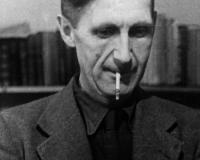
On a Ruined Farm near
the His Master’s Voice
Gramophone Factory
As I stand at the lichened gate
With warring worlds on either hand –
To left the black and budless trees,
The empty sties, the barns that stand
Like tumbling skeletons – and to right
The factory-towers, white and clear
Like distant, glittering cities seen
From a ship’s rail – as I stand here,
I feel, and with a sharper pang,
My mortal sickness; how I give
My heart to weak and stuffless ghosts,
And with the living cannot live.
The acid smoke has soured the fields,
And browned the few and windworn flowers;
But there, where steel and concrete soar
In dizzy, geometric towers –
There, where the tapering cranes sweep round,
And great wheels turn, and trains roar by
Like strong, low-headed brutes of steel –
There is my world, my home; yet why
So alien still? For I can neither
Dwell in that world, nor turn again
To scythe and spade, but only loiter
Among the trees the smoke has slain.
Yet when the trees were young, men still
Could choose their path – the winged soul,
Not cursed with double doubts, could fly,
Arrow-like to a foreseen goal;
And they who planned those soaring towers,
They too have set their spirit free;
To them their glittering world can bring
Faith, and accepted destiny;
But none to me as I stand here
Between two countries, both-ways torn,
And moveless still, like Buridan’s donkey
Between the water and the corn.
George Orwell
(1903 – 1950)
The Adelphi Magazine, April 1934.
• fleursdumal.nl magazine
More in: Archive O-P, Archive O-P, George Orwell, Orwell, George

Gladness
Unto my Gladness then I cried:
‘I will not be denied!
Answer me now; and tell me why
Thou dost not fall, as a broken star
Out of the Dark where such things are,
And where such bright things die.
How canst thou, with thy fountain dance
Shatter clear sight with radiance?–
How canst thou reach and soar, and fling,
Over my heart’s dark shuddering,
Unearthly lights on everything?
What dost thou see? What dost thou know?’
My Gladness said to me, bowed below,
‘Gladness I am: created so.’
‘And dare’st thou, in my mortal veins
Sing, with the Spring’s descending rains?
While in this hour, and momently,
Forth of myself I look, and see
Torn treasure of my heart’s Desire;
And human glories in the mire,
That should make glad some paradise!–
The childhood strewn in foulest place,
The girlhood, plundered of its grace;
The eyelids shut upon spent eyes
That never looked upon thy face!
Answer me, thou, if answer be!’
My Gladness said to me:
‘Weep if thou wilt; yea, weep, and doubt.
I may not let the Sun go out.’
Then to my Gladness still I cried:
‘And how canst thou abide?–‘
Here, where my listening heart must hark
These sorrows rising from the Dark
Where still they starve, and strive and die,
Who bear each heaviest penalty
Of humanhood;–nor grasp, nor guess,
The garment’s hem of happiness!–
The spear-wound throbbing in my song,
It throbs more bitterly than wrong,–
It burns more wildly than despair,–
The will to share,
The will to share!
Little I knew,–the blind-fold I,–
Joy would become like agony,–
Like arrows of the Sun in me!
* * * * *
I hold thee here. I have thee, now,–
And I am human. But what art thou!’
My Gladness answered me:
‘Wayfarer, wilt thou understand?–
Follow me on. And keep my hand.’
Josephine Preston Peabody
(1874 – 1922)
Gladness
• fleursdumal.nl magazine
More in: # Classic Poetry Archive, Archive O-P, Archive O-P
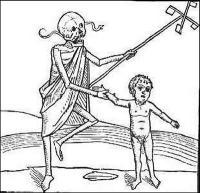
My Baby
He lay on my breast so sweet and fair,
I fondly fancied his home was there,
Nor thought that the eyes of merry blue,
With baby love for me laughing through,
Were pining to go from whence he came,
Leaving my arm empty and heart in pain,
Longing to spread out his wings and fly
To his native home far beyond the sky
They took him out of my arms and said
My baby so sweet and fair was dead,
My baby that was my heart’s delight
The fair little body they robed in white
Flowers they placed at the head and feet
Like my baby fair, like my baby sweet,
They laid him down in a certain place,
And round him they draped soft folds of lace
Till I’d look my last at my baby white,
Before they carried him from my sight,
By the sweet dead babe, so fair to see,
They tried in kindness to comfort me
They said, he is safe from care and pain,
Safe and unspotted by sin or stain;
Before the mystery of the years
Brings heart ache or pang, or sorrow’s tears.
He’s safe, sweet lamb, in the Shepherd’s care,
Sorrow nor suffering enters there;
But with brow of gladness, clothed in light,
He is fair as the angels in His sight.
I know what they said to me was true,
And should have fallen on my heart like dew;
For, although my grief was very sore,
My baby was safe for evermore.
I know that they spoke with kindly care,
My grief to comfort and soothe, or share;
But I gave my baby the last, last kiss,
Saying, God alone comforts grief like this.
Nora Pembroke
(Margaret Moran Dixon McDougall)
1826 – 1898
My Baby
• fleursdumal.nl magazine
More in: - Archive Tombeau de la jeunesse, Archive O-P, Archive O-P, CLASSIC POETRY
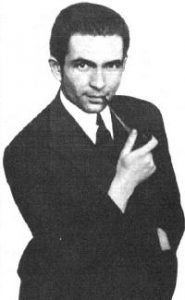
Gulden Sporen
Negentienhonderd Zestien
In dertienhonderd en twee
beken naar de stroom, stromen naar de zee,
zó de verdedigers van het vlaamse-gemeente-sisteem, sterk in de strijd,
wal, tegen de aanval van de franse leenroerigheid;
zee-wal, pal, als de Rode Zee ten tijde van de Eksode
was, tocht van godsvolk naar Kanaäan, tocht der Joden.
Maar negentienhonderd zestien
zal, zij aan zij,
pal, rij op rij,
het aktieve leger groeien zien,
tot een wil en tot een daad,
gekromd de rug en vuist gebald, die de vijand slaat
en de nacht; breekt de dag door dageraad.
Negentienhonderd zestien, jaar dat woord werd,
woord dat vlees werd,
leger van ons land,
wachtersdaad bij wachterswoord en -hand.
Vastberaân, wij staan
in kamp. Wij staan.
… Ik en de stad …
Paul van Ostaijen
(1896 – 1928)
Gulden Sporen
Negentienhonderd Zestien
• fleursdumal.nl magazine
More in: Archive O-P, Archive O-P, Ostaijen, Paul van, Paul van Ostaijen
Thank you for reading Fleurs du Mal - magazine for art & literature